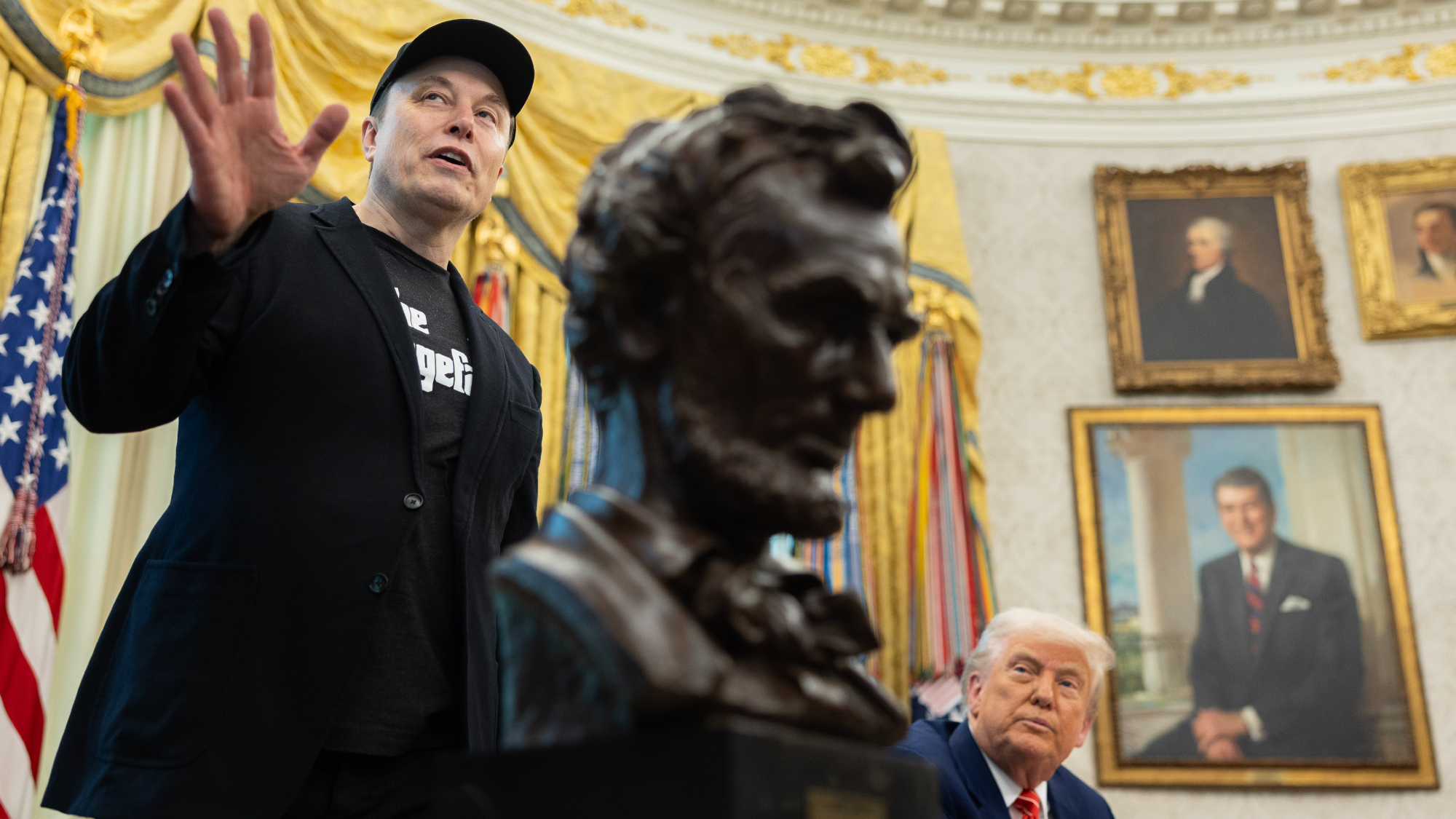Why the 2016 primary could give Democrats everything they want
With Bernie Sanders on the rise, the left can expect a substantive policy debate — without vitriol

Bernie Sanders is on the rise.
As The New York Times reported Monday, Sanders is bringing out unusually large crowds in Iowa for a candidate no one gives any chance of winning:
He drew 700 people to an event on Thursday night in Davenport, for instance — the largest rally in the state for any single candidate this campaign season, and far more than the 50 people who attended a rally there on Saturday with former Gov. Martin O'Malley of Maryland. [The New York Times]
The Washington Post's Chris Cillizza cites the "Bernie-mentum" that is sweeping the Hawkeye State. With Hillary Clinton doing precious little actual campaigning at the moment, Sanders is suddenly the hottest thing on the campaign trail.
The Week
Escape your echo chamber. Get the facts behind the news, plus analysis from multiple perspectives.

Sign up for The Week's Free Newsletters
From our morning news briefing to a weekly Good News Newsletter, get the best of The Week delivered directly to your inbox.
From our morning news briefing to a weekly Good News Newsletter, get the best of The Week delivered directly to your inbox.
Understanding Sanders' candidacy may require us to hold two thoughts in our head simultaneously. The first is that significant numbers of Democrats are pleased that Sanders is in the race, very much appreciate his focus on inequalities not only of wealth but also of power, are attracted to his more unusual ideas like giving a free college education to anyone, and might consider voting for him in their state's contest. The second is that by next summer, even those Democrats will be perfectly happy to have Hillary Clinton as their nominee.
In a way, Clinton's nearly inevitable nomination has liberated Democrats to approach this primary campaign in a different way. Unlike Republican voters, who are trying to figure out not only whom they like but who is "electable" (always a tricky judgment to make), Democrats can focus on questions like: What does it mean to be a Democrat in 2015? What kinds of policies are required to address the decades-long problems in the American economy? What parts of the liberal agenda are most urgent as the Obama administration winds down? In other words, they can actually contemplate important issues.
A primary featuring a debate between Clinton, Sanders, and Martin O'Malley could give Democratic voters nearly everything they want. They get a substantive debate that helps define the party's identity and agenda, with O'Malley staking out a space slightly to Clinton's left and Sanders even farther to the left. They also get a race that will be largely free of the kind of negativity that almost inevitably occurs when voting approaches and candidates get desperate to take down the front-runner or dispatch an opponent.
The Republican race may have been mostly civil up until now, but just you wait — in a few months, it's going to get nasty. But that's unlikely to happen on the Democratic side. Sanders notes proudly that he's never run a negative ad in his whole career, and he seems to have little interest in attacking Clinton. O'Malley is smart enough to know that going after her in some kind of personal way probably won't gain him much, and will certainly jeopardize his chances of getting a future post (like maybe VP) that could be his consolation prize for coming in second or third.
A free daily email with the biggest news stories of the day – and the best features from TheWeek.com
That also means that, barring some unexpected turn of events, Clinton will emerge from the primaries having spent a good deal of time debating policy, but not getting damaged by her opponents. While there are some things of value to be gained from a tough primary race, many a candidate has emerged from a hard-fought primary with their flaws magnified and their reputation damaged.
To be clear, when I say that Democrats are happy to have a real race but will also be happy to have Clinton as a nominee, I'm not saying they're just resigned to being stuck with her. She's overwhelmingly popular with the Democratic base; polls show her favorability among Democrats in the 70s or 80s (see here or here, for example). As Matthew Yglesias recently pointed out, Clinton is by almost any measure the most popular politician in America, even if journalists dislike her intensely. Those journalists have their reasons — her campaign hasn't provided a lot of access, and she seems unaffected by the "scandals" on which they've spent so much time — but legitimate or not, their antipathy isn't shared by Democratic voters.
Some of those hundreds of people showing up to hear Bernie Sanders speak may believe he'll somehow manage to become the Democratic nominee. But most are probably coming because they're attracted to what he's saying. Yet I promise you, nearly all of them will end up voting for Hillary Clinton next November.
Between now and then, they could be in for a treat: a substantive, respectful primary campaign that sets an agenda for their party and forces their eventual nominee to take clearly articulated positions on the issues they care about. Clinton may even take on one or two of Sanders' ideas.
It may be hard for us in the media to wrap our heads around the idea of a meaningful primary campaign in which the outcome is not really in doubt. But that's what Democrats could be in for, so we ought to figure out how to cover it.
Paul Waldman is a senior writer with The American Prospect magazine and a blogger for The Washington Post. His writing has appeared in dozens of newspapers, magazines, and web sites, and he is the author or co-author of four books on media and politics.
-
 ‘This is a structural weakening of elder protections’
‘This is a structural weakening of elder protections’Instant Opinion Opinion, comment and editorials of the day
-
 4 tips to safeguard your accounts against data breaches
4 tips to safeguard your accounts against data breachesThe Explainer Even once you have been victimized, there are steps you can take to minimize the damage
-
 The Week's year-end quiz
The Week's year-end quizPuzzles and quizzes Test how well you followed the news with our year-end quiz
-
 Bari Weiss’ ‘60 Minutes’ scandal is about more than one report
Bari Weiss’ ‘60 Minutes’ scandal is about more than one reportIN THE SPOTLIGHT By blocking an approved segment on a controversial prison holding US deportees in El Salvador, the editor-in-chief of CBS News has become the main story
-
 Has Zohran Mamdani shown the Democrats how to win again?
Has Zohran Mamdani shown the Democrats how to win again?Today’s Big Question New York City mayoral election touted as victory for left-wing populists but moderate centrist wins elsewhere present more complex path for Democratic Party
-
 Millions turn out for anti-Trump ‘No Kings’ rallies
Millions turn out for anti-Trump ‘No Kings’ ralliesSpeed Read An estimated 7 million people participated, 2 million more than at the first ‘No Kings’ protest in June
-
 Ghislaine Maxwell: angling for a Trump pardon
Ghislaine Maxwell: angling for a Trump pardonTalking Point Convicted sex trafficker's testimony could shed new light on president's links to Jeffrey Epstein
-
 The last words and final moments of 40 presidents
The last words and final moments of 40 presidentsThe Explainer Some are eloquent quotes worthy of the holders of the highest office in the nation, and others... aren't
-
 The JFK files: the truth at last?
The JFK files: the truth at last?In The Spotlight More than 64,000 previously classified documents relating the 1963 assassination of John F. Kennedy have been released by the Trump administration
-
 'Seriously, not literally': how should the world take Donald Trump?
'Seriously, not literally': how should the world take Donald Trump?Today's big question White House rhetoric and reality look likely to become increasingly blurred
-
 Will Trump's 'madman' strategy pay off?
Will Trump's 'madman' strategy pay off?Today's Big Question Incoming US president likes to seem unpredictable but, this time round, world leaders could be wise to his playbook
